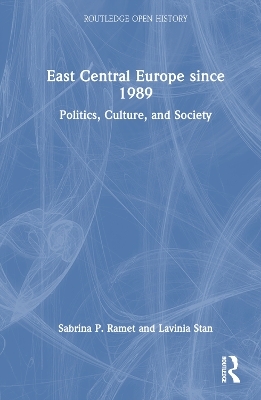
East Central Europe since 1989
Routledge (Verlag)
978-1-032-31920-9 (ISBN)
- Noch nicht erschienen (ca. Februar 2025)
- Versandkostenfrei innerhalb Deutschlands
- Auch auf Rechnung
- Verfügbarkeit in der Filiale vor Ort prüfen
- Artikel merken
Communism in East Central Europe had cracks from the beginning, as uprisings in East Germany in 1953 and Hungary in 1956 demonstrated. But with the establishment of the Independent Trade Union Solidarity in Poland in summer 1980, communism went into steady decline and, between 1988 and 1991, crumbled. What followed has been an unsteady transition to various forms of often corrupt pluralism with democracy doing best in the Czech Republic (with the exception of the years 2017–2021) and Slovenia, and worst in Hungary, Albania, Serbia, and Bosnia-Herzegovina. Drawing on the functionalist theory of Robert K. Merton, the authors examine what policy-makers – communist and post-communist – were or are trying to accomplish, the intended and unintended results of these policies, and the side-effects they have produced.
This volume will be of interest not only to specialists in East Central Europe but also to graduate and undergraduate students, members of the diplomatic corps, and general readers.
Sabrina P. Ramet is a Professor Emerita at the Norwegian University of Science and Technology (NTNU). She is the author of 16 scholarly books, including East Central Europe and Communism: Politics, Culture, and Society, 1943–1991 and editor or co-editor of 42 scholarly books. Lavinia Stan is the European Research Area (ERA) Chair and Professor at St. Francis Xavier University, Canada. She is author, co-author, editor, or co-editor of numerous previous books, among them Post-Communist Transitional Justice: Lessons from 25 Years of Experience.
1. The Functions of Pluralism, the Dysfunctions of Populism: An Introduction 2. Changes in Political Institutions and Party Systems 3. Unintended Consequences in the Economic Transition 4. The Functions, Dysfunctions, and Unintended Consequences of War: Yugoslav Conflicts, 1991–2001 5. The Latent Functions of EU Accession and EU Norms 6. The Media — Functioning in Whose Interest? 7. God, Religious Institutions, and Politics 8. Transitional Justice 9. Patterns of Inequality of Gender and Sexual Orientation Since 1989: The Latent Dysfunctionality of Patriarchy, the Unexpected Consequences of Policy Decisions 10. The Latent Functions of Literature 11. Drivers of Change – A Functionalist Perspective
| Erscheint lt. Verlag | 1.2.2025 |
|---|---|
| Reihe/Serie | Routledge Open History |
| Zusatzinfo | 44 Tables, black and white |
| Verlagsort | London |
| Sprache | englisch |
| Maße | 156 x 234 mm |
| Themenwelt | Geschichte ► Allgemeine Geschichte ► Zeitgeschichte |
| Geisteswissenschaften ► Geschichte ► Regional- / Ländergeschichte | |
| Sozialwissenschaften ► Politik / Verwaltung ► Politische Systeme | |
| Sozialwissenschaften ► Politik / Verwaltung ► Politische Theorie | |
| ISBN-10 | 1-032-31920-8 / 1032319208 |
| ISBN-13 | 978-1-032-31920-9 / 9781032319209 |
| Zustand | Neuware |
| Haben Sie eine Frage zum Produkt? |
aus dem Bereich


